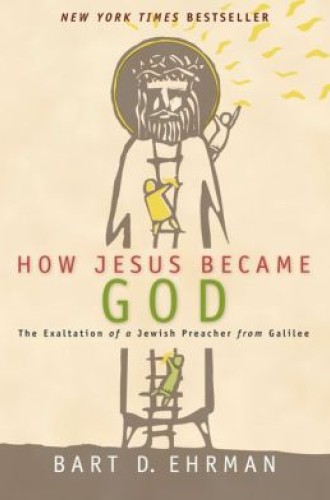Lord and God
Through his words and actions, Jesus of Nazareth excited expectations that he was (or would be) the Messiah. That Jesus inspired this hope likely led the Roman authorities to crucify him. Jesus didn’t actually claim divinity for himself, and he wasn’t worshiped as such during his earthly ministry. The ascription of divine status to Jesus and the accompanying devotional practices that are reflected in the New Testament arose only after—though astonishingly soon after—Jesus’ crucifixion. Key to this development were experiences (“visions”) of the resurrected Jesus, which generated in the earliest circles of Jewish believers the conviction that God had raised Jesus (bodily) from death and exalted him to a unique heavenly status and glory. Further developments in christological belief over the ensuing decades and centuries led to the classic doctrine of the Trinity.
That, in a nutshell, is the thrust of Bart Ehrman’s book. To anyone familiar with a historical approach to the topic, these will not be novel conclusions. Indeed, they have been affirmed by a significant number of New Testament scholars, especially over the past several decades. That an astonishing “high Christology” erupted quite soon after Jesus’ crucifixion, and that the risen Jesus featured remarkably in the corporate devotional practices of earliest believers, has been increasingly recognized. As the great German New Testament scholar Martin Hengel observed about developments in the 20 years between Jesus’ execution and the earliest letters of Paul, “in essentials more happened in Christology within these few years than in the whole subsequent seven hundred years of church history.”
Read our latest issue or browse back issues.
However, Ehrman’s book is intended for readers generally unacquainted with this scholarly work. Among those readers he obviously aims to have a dramatic impact. Many Christians unacquainted with the historical data will assume that beliefs about Jesus’ divine status derive from Jesus’ own claims, and many non-Christians will likewise assume that the validity of traditional Christian beliefs about Jesus depends upon whether Jesus actually made corresponding claims. For both kinds of readers, the “news” that Jesus didn’t actually make the sort of claims for himself that earliest believers made about him may seem somewhat sensational.
As in his other popular books, Ehrman clearly seeks not simply to inform but also to stir controversy among this varied readership. More specifically, he hopes to startle naive traditionalist Christians, nettle anxious apologists of Christian faith, and reassure fellow agnostics (Ehrman’s self-description) and skeptics that there is justification for their doubt. (He is obviously able to stir a response: published almost simultaneously with this book is a multiauthor riposte, How God Became Jesus: The Real Origins of Belief in Jesus’ Divine Nature, released by Zondervan.)
Ehrman’s polemical agenda may well make for a lively discussion and a marketable book, but it also lessens somewhat his ability to give a balanced historical picture. Ehrman, who teaches at the University of North Carolina in Chapel Hill, gained prominence by way of a string of books with a similarly sensational tone aimed at a general readership on a variety of topics—variants in New Testament manuscripts (Misquoting Jesus), the problem of evil (God’s Problem), and pseudonymous writings in the Bible (Forged). These books generated appearances on The Daily Show and The Colbert Report and phenomenal sales, at least compared to most books by scholars. In all these works he makes frequent reference to his own journey from naive and fundamentalist Christian to voluble (but generally genial) agnostic. Along with (and as another result of) his popular books, he often engages in public debates with Christian apologists, adding to his public stature.
In those prior books, Ehrman drew more directly on his own scholarly expertise. In this one he focuses on matters on which he himself has not been a noted contributor. He draws heavily (and respectfully) on the work of a number of other scholars (including my own work, such as Lord Jesus Christ: Devotion to Jesus in Earliest Christianity) who in recent decades have probed the origins of belief in Jesus as divine. Ehrman is often good at making scholarly arguments accessible. Unfortunately, in a few matters he oversimplifies or misconstrues things, and in other cases his claims and arguments appear one-sided.
An example of oversimplifying: in the first chapter Ehrman rightly notes that the Roman world was full of gods and deified humans (especially deified rulers), and he suggests that this phenomenon helps explain the emergence of beliefs about Jesus as divine. But he fails to indicate that for Roman-era Jews the plurality of deities and demigods and the practice of deifying rulers were repellent, even blasphemous. More of an explanation is needed as to how the multiplicity of deities in the Roman environment could have been a relevant and facilitating factor for considering Jesus divine in the circles of devout Jews among whom (as Ehrman readily grants) the divinity of Jesus was first asserted.
An example of his intrusive polemical concern is his discussion of what we can and cannot know about Jesus’ resurrection. He points out that historians cannot answer the question of whether God actually raised Jesus from death and exalted him to heavenly glory. Historians can observe that early believers claimed to have seen the risen Jesus and can trace the effects of these claims, but as historians they cannot judge whether these claims are valid or not, for that is a theological or philosophical judgment. Ehrman professes to have no concern for either establishing or refuting these claims; he aims simply to trace their historical effects.
But he wanders from these strictures in a section where he likens early Christian experiences of the risen Jesus to such hallucinatory phenomena as “visions” of deceased loved ones. And such phenomena aren’t true analogies. The grief experiences he cites don’t typically involve a resurrected loved one in glorified form, who is exalted to heavenly glory at God’s right hand. This fact suggests that something other than grief experiences was at work in the “visions” of the risen Jesus. Ehrman’s discussion seems more intended to counter Christian apologists’ references to resurrection appearances than to offer a balanced consideration. His earlier claim about sidestepping the question of the validity of early Christian claims seems coy.
Polemical concerns also intrude on his curiously prolonged argument that Jesus likely wasn’t given a proper burial but was cast into a criminal’s grave or left for carrion. His account seems designed more to challenge Christian claims about an empty tomb than to provide a balanced historical analysis of relevant burial practices. He does not cite examples of the ancient Jewish view that burial of the dead—including criminals and, notably, even those crucified—is a solemn religious duty (e.g., Tobit 1:16–18; Josephus, Jewish War 4.317). This Jewish concern is materially demonstrated in the only extant remains of a Roman-era crucified man, which were found properly entombed at Giv’at Ha-Mivtar (in Israel).
Another problem is Ehrman’s discussion of Jesus’ use of the expression “the Son of Man.” He claims that Jesus (having either coined the expression or appropriated it from some unknown source) used the phrase to refer to a future figure, not himself. But if the expression wasn’t a fixed and known title (as most scholars now recognize, and which Ehrman grants), how then would Jesus’ disciples have grasped what he was talking about? It seems much more plausible that Jesus took the Hebrew/Aramaic idiom “son of man” and gave it a particularizing force, “the Son of Man,” using it as his distinctive self-referential designation. This is also rather clearly how the idiom functions in the Gospels.
Curiously, Ehrman thinks that the early Christians thought the incarnation meant that Jesus was “temporarily human.” On the contrary, in traditional Christian teaching Jesus’ incarnation is an irrevocable assumption of human nature, and his resurrected body prefigures the glory to be accorded also to believers (e.g., Phil. 3:21).
Ehrman thinks it is highly significant that the New Testament writers don’t identify Jesus as God the Father. It’s true that they don’t, but neither did the subsequent classical expressions of Christology, even expressions of Jesus’ divinity “in a complete, full, and perfect sense” (Ehrman’s phrase). Instead, from Justin Martyr onward the classic Christian writers emphasized that “the Father” and “the Son” were “numerically distinct.”
In his discussion of the origins of beliefs about Jesus’ divine status, Ehrman makes a point of distinguishing between “exaltation” Christology (Jesus’ divine status is conferred by God at his resurrection) and “incarnation” Christology (Jesus is a “preexistent” divine being). To be sure, New Testament writings reflect these two emphases. One exaltation statement, Romans 1:3–4, refers to Jesus as “designated/declared the Son of God with power according to the Spirit of holiness through resurrection from the dead.” As Ehrman explains helpfully, this text is one of a number in which Paul apparently incorporates confessional formulae that derive from a much earlier period and had already become traditional by the time he wrote his epistles (during the fifties of the first century).
Ehrman then opines that incarnation Christology came about “somewhat later,” granting, however, that it was “remarkably early”—so early that it is already presupposed by Paul. He does not consider evidence from ancient Jewish sources (especially apocalyptic texts such as 1 Enoch) that the “preexistence” of eschatological figures was a Jewish theological trope. This evidence suggests that Jesus’ preexistence could well have been an almost immediate corollary of the conviction that God had exalted him uniquely to heavenly/divine glory as the eschatological redeemer, the Messiah.
This, in turn, would explain why (as Ehrman also grants) these two types of christological statements are often combined in the earliest sources. Illustrative of this is the famous hymnic passage in Philippians 2:6–11, in which most scholars (including Ehrman) see the preexistent and divine Jesus described as first becoming “incarnate” as a man (vv. 6–8) and then subsequently exalted by God to a uniquely high status as “Kyrios,” to be acknowledged by all spheres of creation (vv. 9–11). In short, it’s not all that clear that first-generation Christians distinguished as sharply as Ehrman does between claims about Jesus’ exaltation and his preexistence, or saw them as in tension with each other.
Ehrman’s assertion that Paul saw Jesus as an angelic being is yet another curiosity. For Ehrman, this view is key to Paul’s Christology. But Ehrman’s discussion rests far too heavily on his claim (not shared by most interpreters) that in Galatians 4:14 Paul identifies Jesus as the/an “angel of God.” Instead, Paul’s statement that the Galatians had received him “as an angel of God, as Christ Jesus,” seems to most exegetes to be an ascending set of alternatives. Ehrman also ignores evidence that Paul distinguished Jesus from the angels (e.g., Rom. 8:31–39). I would add that there is no evidence that angels (or any putative “Son of Man”) received worship in the gatherings of any known Roman-era Jews. So the remarkable place of the risen Jesus in earliest Christian worship cannot be explained as a consequence of an alleged view of him as an angel.
In sum, this book elicits a mixed response. On the one hand, Ehrman is a generally good communicator, and the book may well introduce many readers to some of the issues and approaches involved in the scholarly investigation of Christian origins. But at points his argument is either somewhat misinformed or dubious.
The astonishing early Christian claims about the risen Jesus’ divine status and the accompanying constellation of devotional practices appear to constitute a novel development in the Roman-era setting. They are in contrast to Jewish or “pagan” religious phenomena. These claims and practices are perhaps now so familiar both to Christians and non-Christians that their sheer novelty and astonishing character are no longer noticed. If Ehrman’s book provokes further interest in the remarkable eruption of Jesus devotion in earliest Christianity, it will have had a good effect.






